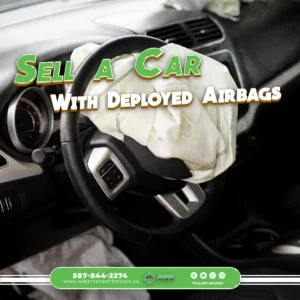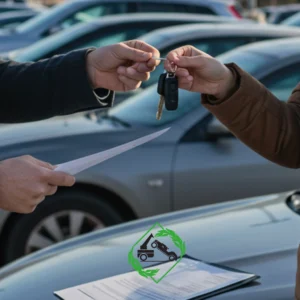Selling your used car to a relative, like a sibling or a cousin, is quite common due to familiarity and trust already established. However, family transactions also call for extra care and precaution compared to third-party deals. Muddied communication and unclear expectations around pricing, maintenance costs, and contingencies between relatives often crop up later. Hence certain best practices can streamline the experience and prevent complications down the road for both parties. In this comprehensive guide on Cash for cars Calgary, we’ll explore essential tips for selling your car to a relative to make the experience seamless and mutually beneficial.
No Hassle, Just Cash — Book Your Free Pickup or Quote Today!
Discuss Key Considerations Openly
Before proceeding with the sale, as the main tips for selling your car to a relative, sit down with your relative and run through key factors on top of the vehicle pricing like operating costs, anticipated major repairs, insurance, transfer paperwork, etc. Highlight any existing mechanical issues or accident history. Giving them a realistic picture regardless of your emotional attachment helps set mutual transparency and responsibility. Budgeting through likely maintenance bills in the vehicle lifespan prevents financial shocks later.
A common consideration for relatives purchasing each other’s used cars is significantly lowering or even waiving the selling price. Make sure both parties are aligned on pricing expectations rather than assumptions. If essential for affordability, set a token discounted price to retain a sense of transaction formality for future reference. Some states allow transfer taxes to be waived for gifted cars to relatives when a gift letter is added to the paperwork. Discuss which complementary services like helping with repairs you are open to offering as a goodwill gesture as well.
Get an Independent Appraisal
Before finalizing any pricing with your relative, solicit a third-party professional vehicle appraisal. Online sites that take in your car’s make, model, year and condition give comprehensive quotes with pricing breakdowns. You can also approach local dealerships, credit unions, trusted mechanics, etc. for appraisals based on factors like mileage, equipment, cosmetic appearance, etc. This provides objective pricing benchmarks for the negotiation with your relative, preventing over/under-valuation. The standardized appraisal report also acts as a bill of sale record for taxes.
Transfer Paperwork Using Best Practices
Flawed registration, title transfer, and insurance paperwork often cause post-sale disputes. Hence certain protocols are advisable. This is a vital item on tips for selling your car to a relative list, Check your respective state laws on technical requirements for relative transfers, product liability, tax implications, etc. to ensure compliance. Physically sign over the title to your relative and notify your insurance provider. Collect sale tax and VIN verification if required. Reports suggest around 50% of intra-family sales never transfer the title due to assumptions. This risks serious consequences later. Hence officially register the ownership transfer with your state vehicle authority to complete the deal fully. Collect copies of all paperwork involved for both parties.
Ensuring Legal Compliance
Adhering to legal requirements is crucial when selling a car, even within the family. Transfer the title officially, ensuring that all necessary paperwork is completed. Check with local authorities to understand specific regulations and requirements for transferring ownership.
Financing Considerations
Sometimes your relative may request financing help for the used car instead of a one-time payment. You can structure a loan agreement clearly delineating duration, interest charged, installment amounts, and payment collection mechanism. Draft a legally binding contract covering all terms to prevent conflicts. More often for relatives, the selling party themselves might gift a portion of the vehicle price to ease cash flow constraints. This entails relatively minimal legal documents. Simply classify the differential as a ‘gift’ in associated filings and imply the amount as income made from the sale after deducting the gift value for taxes. Keep associated bank trail records to prove the gift transfer later if required.
Read Also: A Proper Junk Car Donation Guide that You Need
Be Transparent on Vehicle History
As the tips for selling your car to a relative continue, you should be transparent about your vehicle history. Any major mechanical repairs or bodywork repairs conducted on the car, accident damage, previous flood exposure, or persistent breakdown issues faced must be revealed irrespective of your relationship. Sometimes sentimentality makes relatives downplay negatives but transparency ensures longevity. Share copies of any available vehicular history reports to substantiate your disclosures. Relay anecdotal incidents faced over ownership as well. Providing thorough maintenance and repair records also builds confidence for relatives inheriting the car. Set clear expectations on how any immediate or forthcoming high-cost repairs will be managed after the sale.
Determine After-Sale Support and Responsibilities
Spell out ahead any post-purchase help you might provide around maintenance, spare parts, or troubleshooting vs what the new owner must handle themselves based on rapport. Generally, for relatives, sellers make themselves available for basic guidance and assistance unless specified otherwise. Discuss contingency measures if unexpected breakdowns or high-cost repairs arise soon after the sale. For minor fixes, the car recipient handles the bills unless the issue clearly existed during original ownership. Decide who claims insurance and whether loan repayment installments get adjusted if the car gets totaled. This avoids misunderstandings.
Handling Post-Sale Issues: Keeping Family Harmony
Even with the best intentions and thorough preparation, sometimes things go wrong after the sale. Maybe a hidden problem pops up, or there’s a disagreement about a repair. How do you handle these situations without causing a family feud?
Open Communication: The Golden Rule
The most important thing is to keep the lines of communication open. Don’t let issues fester. Talk to your relative calmly and respectfully. Listen to their concerns and try to find a solution together. Remember, you’re family, and maintaining that relationship is more important than winning an argument.
Document Everything: It’s Not About Distrust, It’s About Clarity
Even if you’re dealing with family, having documentation can be helpful. Keep records of any agreements you made, any repairs you discussed, and any communication you had about the car. This isn’t about distrust; it’s about having a clear record of what was agreed upon.
Consider Mediation: A Neutral Party Can Help
If you can’t reach an agreement on your own, consider involving a neutral third party. This could be another family member, a mutual friend, or even a professional mediator. They can help facilitate a conversation and find a solution that works for everyone.
Set Realistic Expectations: Things Happen
Remember, cars are machines, and even well-maintained ones can have problems. Try to be understanding and avoid placing blame. Work together to find a solution that’s fair to both parties.
Know When to Let Go: Some Things Aren’t Worth the Drama
Sometimes, even with the best efforts, you might not be able to resolve an issue to everyone’s satisfaction. In these cases, it’s important to know when to let go. Don’t let a car sale damage your relationship.
Draft a Legal Sales Contract
The familiarity of transacting with a relative often tempts skipping thorough documentation. However, protecting both parties through a formal sales agreement listing Vehicle Identification Number, pricing, payment timeline, condition disclosures, etc. creates important legal recourse later if required. Both parties must retain copies after signing the contract. Even adding contingencies like financing repayment terms, breakdown support, and insurance claims in the contract prevents disputes from emerging from assumption gaps. It offers ground rules despite the relationship.
Conclusion
Selling a used car to a family member necessitates balancing emotional considerations with pragmatic protections for both parties via structured processes. We at Cash for Auto Alberta overviewed some of the main tips for selling your car to a relative. Ensuring transparent disclosures, independent pricing inputs, and formal legal documentation allows for realizing pricing and contingency preferences fully while preventing misunderstandings. Proper paperwork around transfers and financing enables compliance. Overall, friendly transactions require as much structured coordination as third-party ones for smooth post-sale association.









